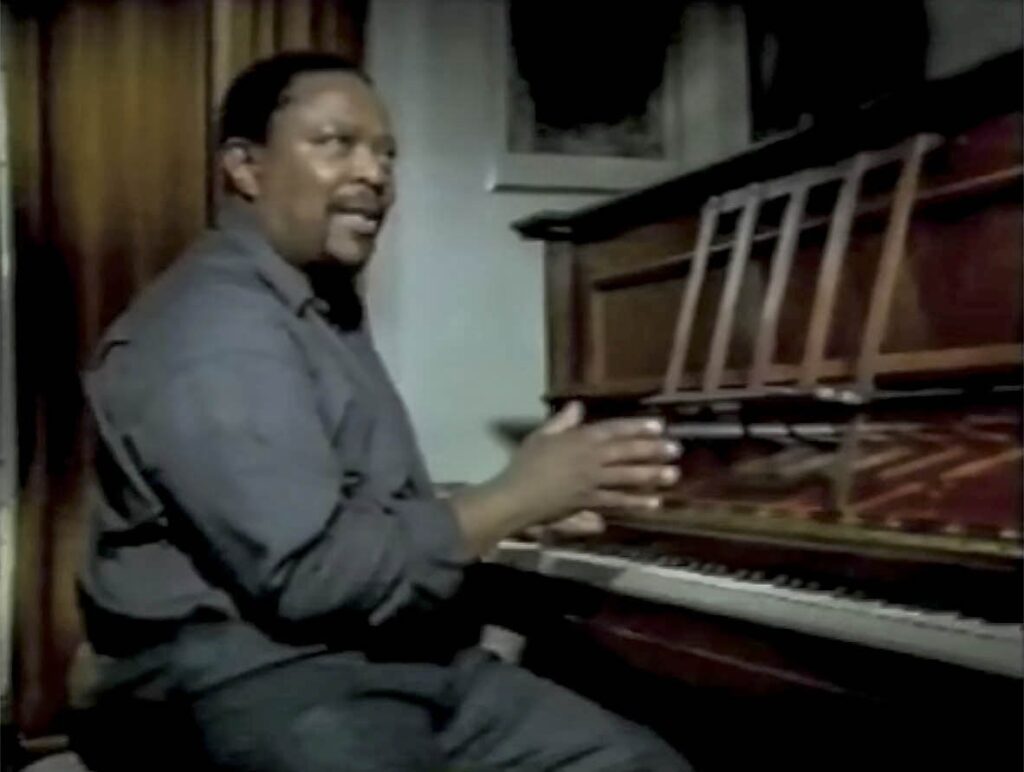A scene from South African Blues, depicting Jonas Gwangwa at the Vortex Jazz Club in London with drummer Churchill Jolobe
“If you listen carefully to all South African music, that cry is there. I don’t care whether you raise the tempo … You could raise the tempo but when it starts playing, that lament is there. Lament … I hear it. I hear it.” — Jonas Gwangwa, South African Blues (Integra Films/BBC)
In the film South African Blues, it is through Jonas Gwangwa’s pathos, defiance and sense of humour that we get a glimpse into the total devastation of exile.
That is hardly to negate the presence of fellow sojourners Sonti Mndebele, Churchill Jolobe, Robbie Sithole and Patience Gcwabe, but more to say that the fimmakers, Silvia Davies and Andy Metcalf, showed insight in purposefully setting it up that way.
Whether seated at the piano belting out a few bars of Sponono or lugging a bag through wet London streets, it is his way with words and his often unguarded body language that see him tie together his compatriots’ experiences.
Flighted in 1990 on the BBC, South African Blues was part of the channel’s 40 Minutes series which ran throughout the 80s and into the early 90s. The film captures what for some, was the tail end of the exile experience, anchoring it in a tactile sense of the elusiveness of home and the trepidation surrounding the moment of return.
“I don’t have a home in London,” Gwangwa says sombrely in the film. “I came here running away from Botswana [after his home was bombed by the South African Defence Force in 1985].
“My family is strewn all over the place. My wife is in the United States because she couldn’t work here. And she’s applied for asylum there. My children are in Holland because I can’t take them to the United States. We haven’t been able to acquire visas for them. So I am just roaming. I don’t have a country as it is.”
The tension between humour and sadness is constant throughout the film. Just moments before Gwangwa’s monologue, we see Jolobe and the trombonist joke at the Vortex Jazz Club about their multiple “nationalities”. But there is a sense of playing to the camera; a sense of humour taking the place of tears.
“Eat your heart out,” says Jolobe. “I’ve been Tanzanian, I’ve been Kenyan, I’ve been United Nations. Now British. Ha ha. Sir Winston Churchill, at last.” But, as Miriam Makeba knew of her nine passports, they were mere symbols, signifiers of a glorified homelessness.
For home haunts the exile, literally, as in the case of Princess Patience Gcwabe. An actress, singer and designer who touched down in London for King Kong’s 1961 West End run, she speaks of the weight of deceased relatives on her shoulders only to confirm their passing when she calls home. Weighing up the failures, the successes and the passage of time in exile, you can sense that her umbilical link to her ancestry supersedes all else.
 Jonas Gwangwa often turns to the piano to drive a point home in South African Blues
Jonas Gwangwa often turns to the piano to drive a point home in South African Blues
Although the film shows attempts at communion, the overwhelming sense is of the loneliness of the exile experience. One can easily read Gwangwa’s image of family “strewn all over the place” as macabre, especially given what he had just survived only a few years before.
But it is an image fitting for everyone in the film. The dismemberment is visible in Mndebele’s anxiety over a son she last saw in 1976, a rupture soothed only by Nomvula, a colleague’s daughter with whom she has forged a close bond. The wounds are also laid bare by Sithole’s waves of rage, brought forth by alienation in a foreign land and vivid memories of losing friends to June 1976.
The figure of Gwangwa at the bar table, holding court with Jolobe; Gwangwa at the piano, a song from home at the ready, is affecting on many levels. At turns, we see him empathetically convey the pain of exile, psychoanalyse it or speak with an almost dispassionate understanding of his enemy’s lack of humanity.
“Our presence as artists, in the first place, is disturbing to the South African government because we always speak to a crowd … and you are saying your piece. And as a South African, you are always talking about South Africa. And if you say something about South Africa, I don’t care if you are pro government or anything, you’ll be talking about South Africa.”
Although there are many versions of the exile experience, what one takes away from watching South African Blues is that the perks can be fleeting, and often outweighed by the feeling of rootlessness.
As a snapshot seen in the year of Nelson Mandela’s release, the film is pregnant with hope and a sense of resolution (Jolobe speaks of FW De Klerk’s perestroika in one of the bar scenes).
Looking at it now, 30 years removed from those seemingly clearing skies, one can’t help but view the film with a sense of fatalism.
As much light as it shed on the psychic effects of exile, it brings up fresh questions about the now. Was it all worth it in the end, given how things have turned out? What do all those who gave selflessly of themselves do with their pain? The pain of yesterday and the pain of today.